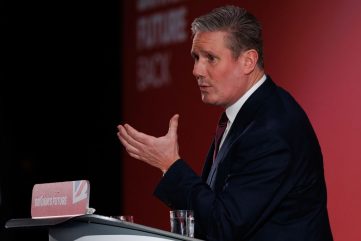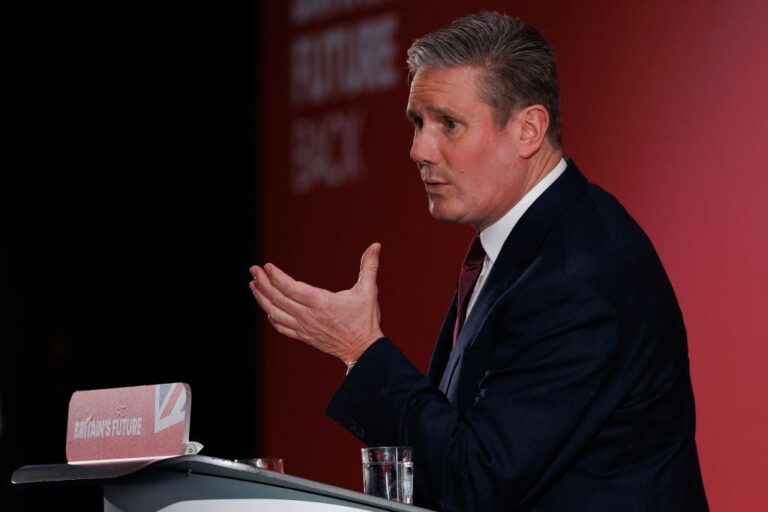
Leader of the Opposition Keir Starmer blamed dire economic conditions for the cut to green investment. Credit: Dan Kitwood/Getty Images.
Keir Starmer, the UK’s Leader of the Opposition, has announced that his Labour Party will scrap its flagship pledge to spend £28bn a year on green energy projects, slashing the fund to just £4.7bn, or £23.7bn over the party’s potential five-year run in office.
The plan, first announced in 2021, was set to be a key piece of policy in the party’s election manifesto. Starmer is expected to say on Thursday that Labour will no longer commit to the annual green investment if it wins the general election, expected to be held in autumn this year. Currently, Labour is leading by some margin in the polls and a win against the current Conservative Government looks likely.
The funding for the party’s Green Prosperity Plan would have seen borrowed money spent on domestic clean energy projects such as battery and electric vehicle factories, offshore wind farms constructed with domestically produced wind turbines and the development of a hydrogen industry. Labour has also outlined plans to create a new, publicly owned clean energy company if it wins the election.
During his announcement, Starmer blamed a dire economic situation, which he said was inherited from former Conservative Prime Minister Liz Truss’s brief time in office in 2022. “As conditions change, you adjust your position,” he said on Thursday. Labour will now only spend £23.7bn over the course of five years, compared with the original £140bn pledged in 2021.
Speculation over whether Labour will walk back on the investment plan has been ongoing for weeks as senior party figures repeatedly refused to specify the £28bn figure when pressed in interviews. However, Starmer himself said as recently as Tuesday that the funding was “desperately needed,” an announcement advocates of the pledge saw as a welcome recommitment.
When the pledge was originally announced by Shadow Chancellor Rachel Reeves, the party planned to begin its £28bn investment immediately after taking office and invest the same amount every year for the following decade. This promise was already watered down in June last year, when Reeves said the full amount would only be reached halfway through Labour’s term, in 2027.
Access the most comprehensive Company Profiles
on the market, powered by GlobalData. Save hours of research. Gain competitive edge.
View profiles in store

Company Profile – free
sample
Your download email will arrive shortly
We are confident about the
unique
quality of our Company Profiles. However, we want you to make the most
beneficial
decision for your business, so we offer a free sample that you can download by
submitting the below form
By GlobalData
Country *
UK
USA
Afghanistan
Åland Islands
Albania
Algeria
American Samoa
Andorra
Angola
Anguilla
Antarctica
Antigua and Barbuda
Argentina
Armenia
Aruba
Australia
Austria
Azerbaijan
Bahamas
Bahrain
Bangladesh
Barbados
Belarus
Belgium
Belize
Benin
Bermuda
Bhutan
Bolivia
Bonaire, Sint
Eustatius
and
Saba
Bosnia and Herzegovina
Botswana
Bouvet Island
Brazil
British Indian Ocean
Territory
Brunei Darussalam
Bulgaria
Burkina Faso
Burundi
Cambodia
Cameroon
Canada
Cape Verde
Cayman Islands
Central African Republic
Chad
Chile
China
Christmas Island
Cocos Islands
Colombia
Comoros
Congo
Democratic Republic
of
the Congo
Cook Islands
Costa Rica
Côte d”Ivoire
Croatia
Cuba
Curaçao
Cyprus
Czech Republic
Denmark
Djibouti
Dominica
Dominican Republic
Ecuador
Egypt
El Salvador
Equatorial Guinea
Eritrea
Estonia
Ethiopia
Falkland Islands
Faroe Islands
Fiji
Finland
France
French Guiana
French Polynesia
French Southern
Territories
Gabon
Gambia
Georgia
Germany
Ghana
Gibraltar
Greece
Greenland
Grenada
Guadeloupe
Guam
Guatemala
Guernsey
Guinea
Guinea-Bissau
Guyana
Haiti
Heard Island and
McDonald
Islands
Holy See
Honduras
Hong Kong
Hungary
Iceland
India
Indonesia
Iran
Iraq
Ireland
Isle of Man
Israel
Italy
Jamaica
Japan
Jersey
Jordan
Kazakhstan
Kenya
Kiribati
North Korea
South Korea
Kuwait
Kyrgyzstan
Lao
Latvia
Lebanon
Lesotho
Liberia
Libyan Arab Jamahiriya
Liechtenstein
Lithuania
Luxembourg
Macao
Macedonia,
The
Former
Yugoslav Republic of
Madagascar
Malawi
Malaysia
Maldives
Mali
Malta
Marshall Islands
Martinique
Mauritania
Mauritius
Mayotte
Mexico
Micronesia
Moldova
Monaco
Mongolia
Montenegro
Montserrat
Morocco
Mozambique
Myanmar
Namibia
Nauru
Nepal
Netherlands
New Caledonia
New Zealand
Nicaragua
Niger
Nigeria
Niue
Norfolk Island
Northern Mariana Islands
Norway
Oman
Pakistan
Palau
Palestinian Territory
Panama
Papua New Guinea
Paraguay
Peru
Philippines
Pitcairn
Poland
Portugal
Puerto Rico
Qatar
Réunion
Romania
Russian Federation
Rwanda
Saint
Helena,
Ascension and Tristan da Cunha
Saint Kitts and Nevis
Saint Lucia
Saint Pierre and Miquelon
Saint Vincent and
The
Grenadines
Samoa
San Marino
Sao Tome and Principe
Saudi Arabia
Senegal
Serbia
Seychelles
Sierra Leone
Singapore
Slovakia
Slovenia
Solomon Islands
Somalia
South Africa
South
Georgia
and The South
Sandwich Islands
Spain
Sri Lanka
Sudan
Suriname
Svalbard and Jan Mayen
Swaziland
Sweden
Switzerland
Syrian Arab Republic
Taiwan
Tajikistan
Tanzania
Thailand
Timor-Leste
Togo
Tokelau
Tonga
Trinidad and Tobago
Tunisia
Turkey
Turkmenistan
Turks and Caicos Islands
Tuvalu
Uganda
Ukraine
United Arab Emirates
US Minor Outlying Islands
Uruguay
Uzbekistan
Vanuatu
Venezuela
Vietnam
British Virgin Islands
US Virgin Islands
Wallis and Futuna
Western Sahara
Yemen
Zambia
Zimbabwe
Kosovo
Industry *
Academia & Education
Aerospace, Defense &
Security
Agriculture
Asset Management
Automotive
Banking & Payments
Chemicals
Construction
Consumer
Foodservice
Government, trade bodies
and NGOs
Health & Fitness
Hospitals & Healthcare
HR, Staffing &
Recruitment
Insurance
Investment Banking
Legal Services
Management Consulting
Marketing & Advertising
Media & Publishing
Medical Devices
Mining
Oil & Gas
Packaging
Pharmaceuticals
Power & Utilities
Private Equity
Real Estate
Retail
Sport
Technology
Telecom
Transportation &
Logistics
Travel, Tourism &
Hospitality
Venture Capital
Tick here to opt out of curated industry news, reports, and event updates from Power Technology.
Submit and
download
Visit our Privacy Policy for more information about our services, how we may use, process and share your personal data, including information of your rights in respect of your personal data and how you can unsubscribe from future marketing communications. Our services are intended for corporate subscribers and you warrant that the email address submitted is your corporate email address.
The U-turn, which could be seen as revealing a weakness in Labour’s policy and financial planning, will be welcome news to the Conservatives as the party continues to trail in the polls, although Prime Minister Rishi Sunak has also faced backlash in the past year for walking back on his own party’s key climate policies and for continuing to grant oil and gas licences in the North Sea.
Laura Trott, Conservative MP and Chief Secretary to the Treasury, told BBC News that Starmer’s U-turn “confirms Labour have no plan for the UK, creating uncertainty for business and our economy. On the day that Labour are finalising their manifesto, Keir Starmer is torpedoing what he has claimed to be his central economic policy purely for short-term campaigning reasons.”
Carla Denyer, co-leader of the Green Party, called the move a “massive backward step”. She said: “Labour have chosen to wear their fiscal rules as a millstone around their neck. A different approach through tax reforms, in particular by introducing a wealth tax on the super-rich, could help pay for the green transition. There is more than enough money in the economy to pay for this.”
Some clean energy companies are less critical. Peter Gerstmann, co-founder of Photovolt Development Partners, the developer of one of Europe’s biggest solar farms, told Power Technology: “The focus on delivering the energy transition need not be driven by large capital spending. Solar farms can deliver the renewable power we need quickly, and relatively cheaply – but only with the right national infrastructure.
“Labour’s focus must turn to increasing the capacity of Ofgem, planning authorities and the national grid to deliver renewables projects at scale,” he added.
Details on new plans will emerge with Labour’s finalised manifesto, the deadline for which has been brought forward to Thursday.


